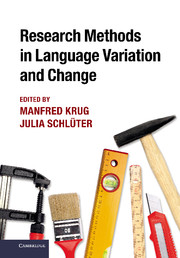Book contents
- Frontmatter
- Contents
- List of Figures
- List of Tables
- List of Contributors
- Preface
- Acknowledgements
- Introduction: Investigating language variation and change
- Part 1 Collecting empirical data
- Part 1.1 Fieldwork and linguistic mapping
- Part 1.2 Eliciting linguistic data
- 4 Designing and conducting interviews and questionnaires
- 5 Obtaining introspective acceptability judgements
- Part 1.3 Alternatives to standard reference corpora
- Part 2 Analysing empirical data
- Part 3 Evaluating empirical data
- Bibliography
- Index
5 - Obtaining introspective acceptability judgements
Published online by Cambridge University Press: 05 June 2014
- Frontmatter
- Contents
- List of Figures
- List of Tables
- List of Contributors
- Preface
- Acknowledgements
- Introduction: Investigating language variation and change
- Part 1 Collecting empirical data
- Part 1.1 Fieldwork and linguistic mapping
- Part 1.2 Eliciting linguistic data
- 4 Designing and conducting interviews and questionnaires
- 5 Obtaining introspective acceptability judgements
- Part 1.3 Alternatives to standard reference corpora
- Part 2 Analysing empirical data
- Part 3 Evaluating empirical data
- Bibliography
- Index
Summary
Introduction
[T]he speaker-hearer’s linguistic intuition is the ultimate standard that determines the accuracy of any proposed grammar, linguistic theory, or operational test.
(Chomsky 1965: 21)We do not need to use intuition in justifying our grammars, and as scientists, we must not use intuition in this way.
(Sampson 2001: 135)The above quotes from Chomsky and Sampson exemplify the controversial status of speakers’ intuitions, i.e. introspection data, in modern linguistics: while speakers’ intuitions form the prime data source for Chomskyan generative linguists, researchers like Sampson deny that introspection can yield any scientific data. As Schütze (1996) has shown, many points of criticism with respect to introspection data are in fact warranted (such as, e.g., that linguists often produce theory and data at the same time). However, he also pointed out that the vast majority of these problems have to do with the fact that this data type is often elicited in an unscientific way. If collected in carefully constructed experimental settings, on the other hand, introspection can yield data that meets the standard criteria for scientific data (Schütze 1996; Cowart 1997). In particular, Magnitude Estimation, an experimental paradigm originally employed in psychophysics (Stevens 1975), has been argued to offer a way to gather and interpret introspection data in a valid, reliable and objective way (cf. Bard, Robertson and Sorace 1996; Keller 2000; Sorace and Keller 2005).
- Type
- Chapter
- Information
- Research Methods in Language Variation and Change , pp. 99 - 118Publisher: Cambridge University PressPrint publication year: 2013
- 7
- Cited by



